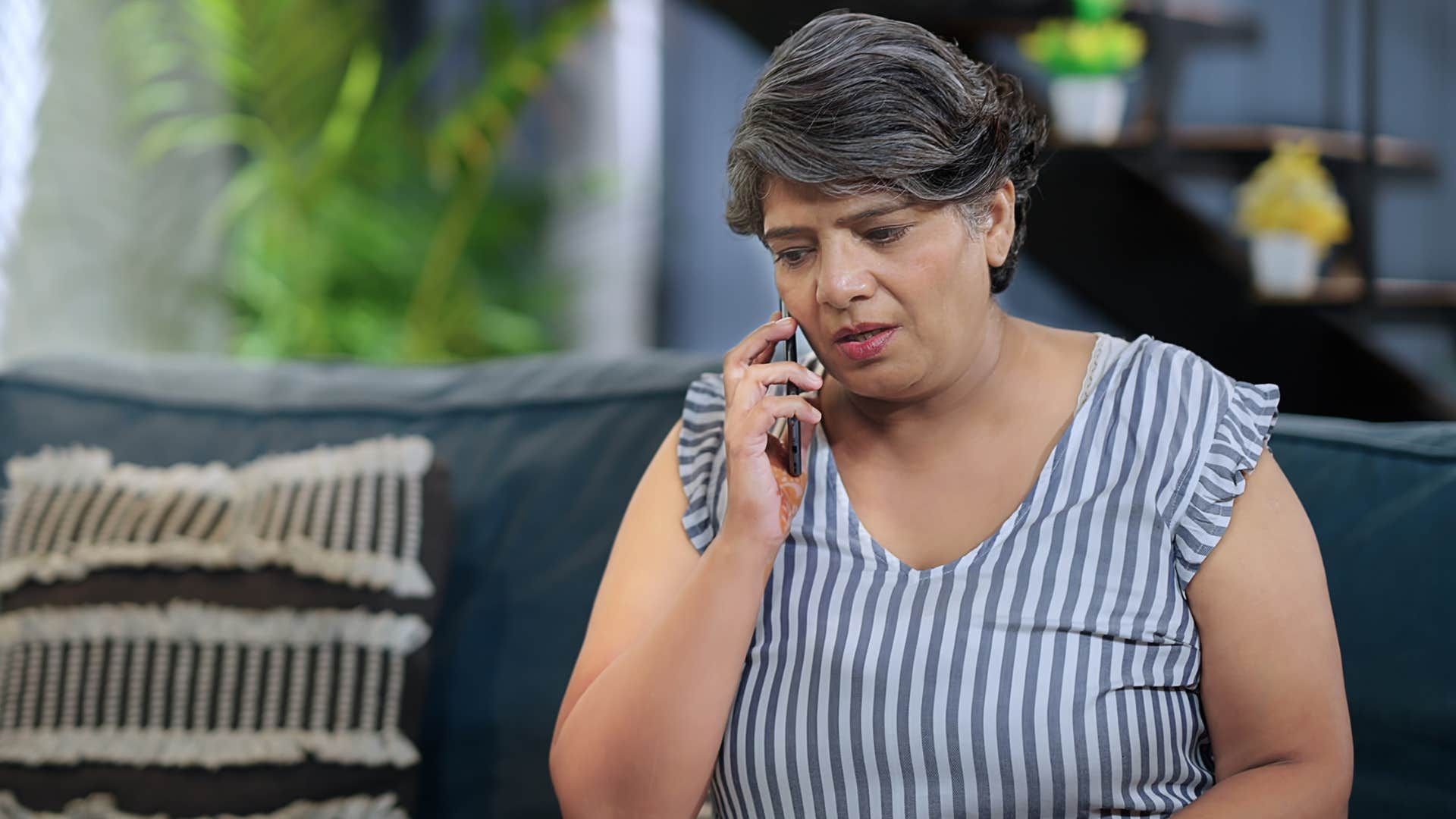11 Real Signs Of A Selfish Adult Child, According To Psychology
Adult children struggle with independence and become self-absorbed, often denying their parents the respect they deserve.
 Alina Rosanova | Shutterstock
Alina Rosanova | Shutterstock It’s not uncommon for adult children, freshly dealing with new struggles in adulthood and navigating their independence for the first time, to become self-absorbed in their own problems and forgo giving grace to their parents. According to psychologist Jeffrey Bernstein, an adult child’s selfishness isn’t usually a direct attack on their parents, but a misalignment of values and a manifestation of the stress they’re experiencing in their personal lives.
The key is to set better boundaries and focus on open and honest communication to build a better dynamic, especially for parents to look out for their well-being. So, what’s the first step? According to psychology experts like Bernstein, you must acknowledge the real signs of a selfish adult child to set boundaries in a healthy way. Figure out what’s causing resentment or disconnection in your life and start there.
Here are 11 real signs of a selfish adult child, according to psychology:
1. They never say ‘thank you’
 Fizkes | Shutterstock.com
Fizkes | Shutterstock.com
According to a study from the Einstein journal, acknowledging and expressing gratitude is the key to being more satisfied and fulfilled in your daily routine. This is why many selfish adult kids get caught in a cycle of resentment and greed when they’re not committed to giving thanks.
While it may be easy to forget or forgo expressing gratitude to your parents amid the chaos of adulthood, making an effort to do so, even in casual conversations and small moments, can protect your relationship from growing tumultuous and divisive.
When parents don’t feel heard, valued, or seen, like any other person in a relationship, they’re not only less likely to support you, they’re less likely to show up at their best in any interaction or situation.
2. They only reach out when they need something
 Raushan_films | Shutterstock.com
Raushan_films | Shutterstock.com
One of the main drivers of tension in parent-child relationships later in life is emotional disconnect and discomfort with changing roles. Parents are no longer responsible for fully taking care of their kids, including helping them make decisions, guiding them in navigating struggles, and even financially supporting their lives.
While it seems obvious, this shifting dynamic can be hard for both parents and their children to navigate, especially given the natural disconnect that happens when children leave home.
Adult children who only reach out when they need something may be selfish, but may not realize they’re even doing it. They get caught up in their lives and routines, so connecting with their parents becomes an avenue for support, rather than connection and communication. By setting a boundary around communication and prioritizing “check-ins” on both sides of the aisle, everyone can feel valued in the relationship, even when someone needs help or support.
3. They guilt-trip to get their way
 Amnaj Khetsamtip | Shutterstock.com
Amnaj Khetsamtip | Shutterstock.com
Experiencing and harboring guilt has adverse effects on general mental health, according to a study from the Guilt and Children journal, which is why weaponizing it in a relationship isn’t just incredibly toxic, but emotionally manipulative.
Adult children may use phrases like “you owe me one” or even bring up old, toxic experiences or resolved childhood traumas to guilt their parents into doing what they want, of course, at the expense of their relationship and parents’ wellbeing.
4. They overstep boundaries
 Fizkes | Shutterstock.com
Fizkes | Shutterstock.com
Boundaries are essential to maintain a healthy balance in a parent-child relationship, but when a selfish adult child actively disrespects their parents, guilt-trips them into getting what they want, and avoids open communication, it can feel overwhelming to try to set them.
Whether they show up unannounced, overstep financial support expectations, or expect their parents to be babysitters at a moment’s notice, overstepping boundaries sparks mistrust and sabotages the balance so many parents and adult children struggle to achieve.
5. They weaponize childhood trauma
 Voronaman | Shutterstock.com
Voronaman | Shutterstock.com
Even if apologies have already been given and the conflict has been resolved, selfish adult children will continue to weaponize their parents' mistakes to get what they want. Whether it’s a mistake they made recently or a fault of their parenting style early in life, they don’t mind emotionally blackmailing their parents.
Their selfish attitude is largely fueled by their inability to view their parents as individual humans. They only view them as parents or support rather than as individuals who deserve respect, independence, grace, and kindness just as much as they do.
Connecting and helping your parents shouldn’t feel like an obligation; they’re your family. Your conversations, support, and kindness shouldn’t feel transactional, because this relationship is intended to be unconditional.
6. They blame their parents for everything
 Prostock-studio | Shutterstock.com
Prostock-studio | Shutterstock.com
According to a study in the Self and Identity journal, giving grace and leading with compassion is key to communicating effectively and navigating a healthy relationship. However, selfish adult children, who generally only have their best interests in mind, tend to overlook that basic empathy and blame their parents for every small mistake and struggle.
From bringing up unresolved conflicts and childhood trauma to blaming them for little struggles they experience in their daily lives, it’s one of the real signs of a selfish adult child, according to psychology experts. Not only does it build a toxic transactional relationship, but it also sparks resentment and disconnection between parents and their kids.
7. They never check-in
 Fizkes | Shutterstock.com
Fizkes | Shutterstock.com
Tension and disconnection in parent-child relationships are far from uncommon; in fact, patterns in “no contact” situations and estrangement reveal that more adult children than ever are separating from their parents over unhealthy communication, resentment, and unresolved trauma. However, selfish adult children may separate themselves from their parents without reason, other than hyper-focusing on their own needs and interests, without considering anyone else’s.
According to psychology, never checking in and only reaching out when they need something is one of the real signs of a selfish adult child.
8. They compete with their siblings
 Prostock-studio | Shutterstock.com
Prostock-studio | Shutterstock.com
Competition between adult siblings can often spark tension and disconnection in the family dynamic as a whole, pressuring parents to take sides and sparking mental health consequences as a result of that favoritism, as a study from the Journal of Marriage and Family explains.
While it may seem like one of the subtle yet real signs of a selfish adult child, it’s a reflection of their personal interests. They let envy, jealousy, and unhealthy competition seep into their family relationships, which gives them the opportunity to seek out their own needs and manipulate their parents to do what they want, even at the expense of everyone else’s well-being.
9. They rarely offer to help
 Motortion Films | Shutterstock.com
Motortion Films | Shutterstock.com
While they’re more than willing to seek out and accept support from their parents, selfish adult children rarely put their own needs aside to help their parents in return. They view their relationship as inherently transactional — always expecting something in return when they go out of their way to help their parents — but they very rarely offer support and help when it doesn’t directly benefit them.
According to psychology experts, many of the real signs of a selfish adult child are subtle, but they often manifest as patterns of behavior that sabotage the family dynamic and make parents feel less valued and unheard.
10. They view their parents as obligations
 Ekateryna Zubal | Shutterstock.com
Ekateryna Zubal | Shutterstock.com
According to psychology experts, viewing their parents as obligations rather than people deserving of grace is one of the real signs of a selfish adult child. Not only does this mindset fuel transactional interactions and behaviors, but it also makes parents feel unheard and underappreciated.
Everyone, regardless of their role in a family dynamic, deserves grace and empathy. They should not be treated like an obligation or something adult children feel pressured to maintain constantly.
11. They play the victim
 ViDI Studio | Shutterstock.com
ViDI Studio | Shutterstock.com
By avoiding accountability with a chronic victim mentality, selfish adult children shift blame toward their parents and force them to suppress emotions and avoid conflict. Not only does this sabotage healthy boundaries and the communication needed to support a healthy family dynamic, but it also encourages selfish adult children to avoid taking responsibility for their mistakes in every aspect of their lives.
While it may protect their societal image, self-esteem in the short term, and general comfort in conflict, according to a 2022 study, it sabotages the well-being of parent-child relationships in the long term.
Zayda Slabbekoorn is a staff writer with a bachelor’s degree in social relations & policy and gender studies who focuses on psychology, relationships, self-help, and human interest stories.

